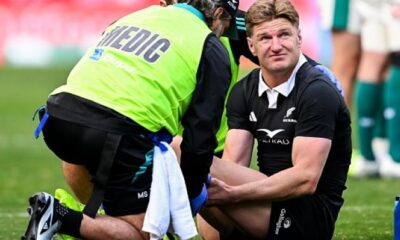Sports
All Blacks Suffer Historic Defeat to Springboks in Wellington

The New Zealand All Blacks faced a devastating defeat against the South African Springboks on March 30, 2024, suffering a historic loss of 43-10 in Wellington. This marked the All Blacks’ heaviest defeat ever, with a staggering 36 points conceded in the second half. Former All Black winger Jeff Wilson expressed his dismay at the performance, drawing parallels to the team’s loss in the 1999 Rugby World Cup semi-final against France.
Wilson noted the striking similarities between the two defeats, particularly how both games saw New Zealand concede a significant number of points in the latter stages. In the 1999 match, the All Blacks allowed France to score 33 points in the second half, ultimately losing 43-31 and ending their World Cup hopes.
Reflecting on the recent game, Wilson stated, “We just had no response, none whatsoever. Our inexperience and some of our frustrations and inconsistencies that have happened over the months came to fruition once again.” He emphasized the importance of mental and emotional resilience, suggesting that the players’ performance may have been impacted by the pressure and expectations surrounding the match.
Just a week prior, the All Blacks had secured a hard-fought 24-17 victory over the Springboks at Eden Park. Wilson pointed out that the sudden shift in performance raises questions about what went wrong in such a short period. He remarked, “If you look at the adjustments and the changes and the selections between the two weeks, the Springboks made a huge number of adjustments and shifts, and they came in with a vastly different game plan.”
Wilson highlighted the weight of expectation on the All Blacks and suggested that the energy expended in preparation for the previous match may have taken a toll. “We looked like a team that was spent in the second half,” he said.
The former winger also pointed to the lack of experience in the All Blacks’ lineup, with several players having participated in fewer than ten test matches. “This is a Springbok team that is deep and vastly experienced as back-to-back World Cup champions,” Wilson noted, indicating that the All Blacks were not able to match their opponents’ depth and experience.
Wilson had anticipated a close contest but was taken aback by the scale of the defeat. “This proved at the moment that they’ve still got something about them. But we just haven’t discovered it as of yet,” he said.
The early loss of halfback Noah Hotham to injury compounded the All Blacks’ challenges, although his replacement, Finlay Christie, had performed admirably in the previous match. Wilson raised questions about the team selection, particularly regarding the back three, suggesting that Caleb Clarke should be considered for future matches.
Looking ahead to the upcoming Bledisloe Cup tests against Australia, Wilson emphasized the need for improvement in set-pieces. “There are not many teams that could have done to the All Blacks what the Springboks did in Wellington,” he remarked, stressing the need for the forward pack to address their inconsistencies.
The All Blacks will have to regroup quickly as they prepare for the challenges that lie ahead, with many questions remaining about their future direction and tactics. As Wilson articulated, “The forward pack as a whole collectively will look at the set piece and go, ‘it’s too inconsistent, and we are vulnerable.'”
The team’s next steps will be critical in restoring confidence and addressing the issues that led to this significant setback.
-

 Sports2 months ago
Sports2 months agoNetball New Zealand Stands Down Dame Noeline Taurua for Series
-

 Entertainment2 months ago
Entertainment2 months agoTributes Pour In for Lachlan Rofe, Reality Star, Dead at 47
-

 Entertainment3 weeks ago
Entertainment3 weeks agoNew ‘Maverick’ Chaser Joins Beat the Chasers Season Finale
-

 Sports2 months ago
Sports2 months agoSilver Ferns Legend Laura Langman Criticizes Team’s Attitude
-

 Sports2 days ago
Sports2 days agoEli Katoa Rushed to Hospital After Sideline Incident During Match
-

 Politics1 month ago
Politics1 month agoNetball NZ Calls for Respect Amid Dame Taurua’s Standoff
-

 Entertainment2 months ago
Entertainment2 months agoKhloe Kardashian Embraces Innovative Stem Cell Therapy in Mexico
-

 World3 months ago
World3 months agoPolice Arrest Multiple Individuals During Funeral for Zain Taikato-Fox
-

 Sports3 months ago
Sports3 months agoGaël Monfils Set to Defend ASB Classic Title in January 2026
-

 Entertainment1 month ago
Entertainment1 month agoTyson Fury’s Daughter Venezuela Gets Engaged at Birthday Bash
-

 Sports1 month ago
Sports1 month agoHeather McMahan Steps Down as Ryder Cup Host After Controversy
-

 World2 weeks ago
World2 weeks agoSevere Winds Hit New Zealand, Over 100 Flights Canceled




















